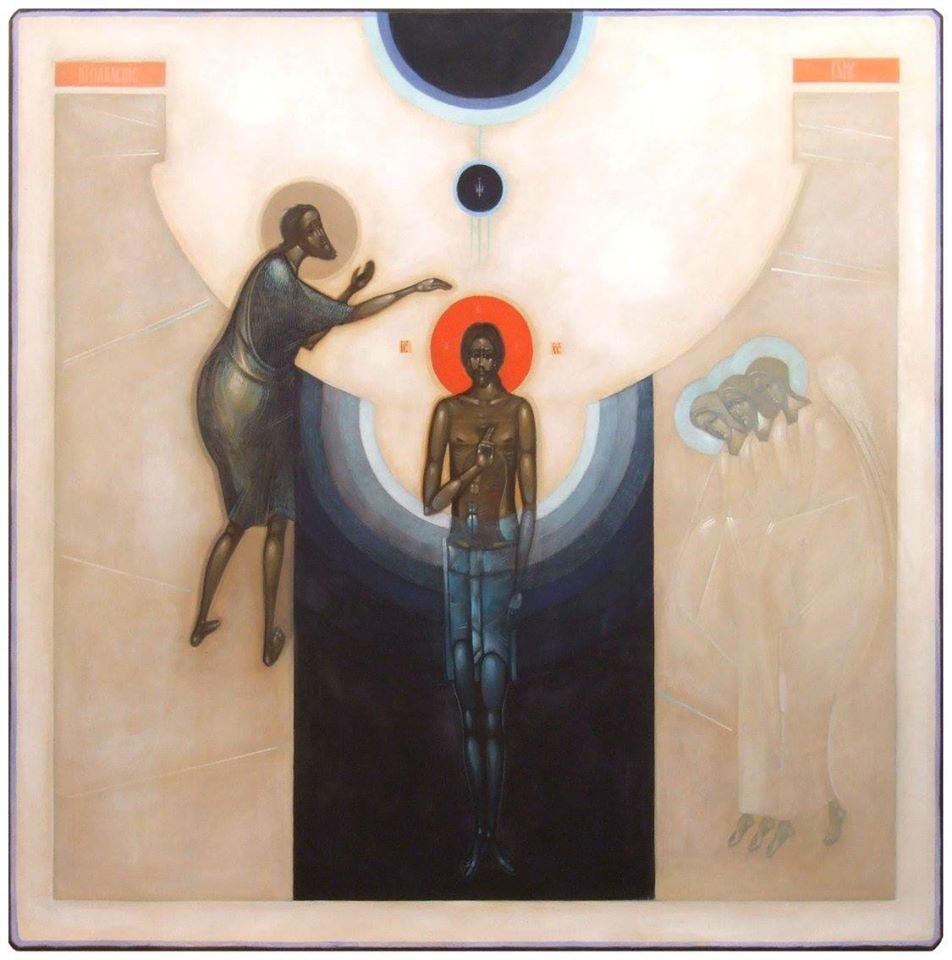Jesus Takes Away the Time John Gives Us
With Christ, there is no time for the If/Then conditions of repentance preaching
Mark 1.1-8
The lectionary gospel text for the Second Sunday of Advent comes from the opening of the Gospel of Mark, a passage in which we find the word gospel in the very first verse followed by the prophecy of Isaiah on the lips of John the Baptizer:
“The beginning of the good news of Jesus Christ, the Son of God. As it is written in the prophet Isaiah, "See, I am sending my messenger ahead of you, who will prepare your way; the voice of one crying out in the wilderness: 'Prepare the way of the Lord, make his paths straight,'" John the baptizer appeared in the wilderness, proclaiming a baptism of repentance for the forgiveness of sins. And people from the whole Judean countryside and all the people of Jerusalem were going out to him, and were baptized by him in the river Jordan, confessing their sins.”
For those who know their Bibles, Mark’s trying to get your attention.
Mark is not (completely) quoting Isaiah.
Mark instead cobbles together a composite of quotes from Israel’s scriptures:
“Behold, I send an angel before you to guard you on the way and to bring you to the land I have prepared for you.” - Exodus 23.20
“Behold, I dispatch my messenger to make a way before me.” - Malachi 3.1a
“...a voice cries out: ‘In the wilderness prepare the way of the Lord, make his paths straight” - Isaiah 40.3
Critically, Mark changes Malachi’s vision of the coming Day of the Lord in two ways:
Mark adds a verb: “construct” (prepare). This is Mark’s way of saying Jesus teaches no path but is himself the new way being forged in an old world.
Mark lops off the rest of Malachi 3.1, which prophesies that “...the Lord whom you seek will suddenly come to his Temple...”
Mark lops off the Temple portion of the prophecy and— notice— in its place adds the citation from Isaiah 40.3 about the Lord’s Day appearing in the wilderness.
For the Christians, the Old Testament ends with the prophet Malachi. Thus, the New Testament begins where the apostles’s Bible concluded. Jews in the first century believed prophecy had ended with Malachi. God had gone silent. This quote plus Mark’s use of the word “arche” (“In the beginning…”) is Mark’s way of proclaiming that the Loquacious Lord is about to speak again, appear again, do something extraordinary.
And God would do so not in the Temple in Jerusalem but in the wilderness— the place where YHVH had sojourned with Moses and the Israelites following the exodus; the place where Elijah had found sanctuary when he was threatened by political authorities.
In just a few sentences, then, Mark introduces the competing symbolic spaces that will thread the rest of his Gospel:
Temple vs Wilderness
Jerusalem/Rome vs the Refugee Camp
Center of Powers vs the Periphery
Along with these competing symbolic spaces, Mark provides an initial contrast between the prophet John who, like the prophets of old, exhorts his hearers to repentance and “Jesus Christ, the Son of God” who is not like the prophets who augured him.
Much like Mark the evangelist, Robert Jenson begins his first mature work, Story and Promise, with a compact summary of how God does God to us in Jesus Christ:
“Since shortly after the execution of Jesus the Nazarene, a certain communication has passed through history and through the world. A few in each generation have told the story of this Jesus, and of his people Israel, as a message of destiny—of the destiny, indeed, of each new set of speakers and hearers. This story, its messengers have claimed, is the encompassing plot of all men’s stories; it promises the outcome of the entire human enterprise and of each man’s involvement in it. Let me try a premature summary formulation of the story and its promise, at some risk of ambiguity: “There has lived a man wholly for others, all the way to death; and he has risen, so that his self-giving will finally triumph.”
Simply:
The gospel is a story and a promise.
The gospel is a story with a promise.
The gospel is a story that is promise.
In other words, the gospel is necessarily more than the communication of certain facts about a person who lived two thousand years ago. As a story, the gospel includes “facts,” for Jesus was a man who lived and died in human history, but from the beginning these facts have been presented in a specific way—as eschatological pledge for the future of humanity. In the opening of Story and Promise, Jenson describes Christ as a human being who lived fully and completely for others. Like Bonhoeffer, Jenson refers to Jesus as “the man for others;” that is, the life of Jesus was perfectly determined by love—by love of God, whom he addressed as “Father,” and by love of his sisters and brothers, for whose sake he embraced crucifixion in obedience to his Father’s atoning will.
The shorthand “the man for others” is a subtle but essential way in which Jenson distinguishes Jesus the Nazarene from other eschatological prophets. After all, it would be easy to confuse Jesus for a prophet just like John the Baptist.
As Dale Allison summarizes:
“Jesus the Nazarene was a wandering preacher, a semi-rabbi. He went from place to place proclaiming the coming of the “Kingdom of God.” “Kingdom of God” was a summary name for the fulfillment of all the promises which Israel’s history with Jahve had left with her. With John “the Baptist,” prophets were, surprisingly, again on the scene; also Jesus was a sort of prophet. He said: “The time is fulfilled, and the kingdom of God is at hand. Turn your lives around, and trust the good news.””
Amos and Micah, Jeremiah and John could also fit this prophetic description.
Indeed all of Israel’s prophets called God’s people to repentance as John the Baptist does at the beginning of Mark’s Gospel.
They likewise proclaimed the Day of the Lord and the turning of the ages.
What is the difference Christ makes?
“The time is short. The judgment of God is at hand. The kingdom is almost upon us. Change your lives now, before it is too late. If you do, you will partake of the goodness and blessings of the reign of God; if you do not, you will know only tribulation and condemnation.”
Jesus also preached in this register.
How is Jesus different than John?
Keep reading with a 7-day free trial
Subscribe to Tamed Cynic to keep reading this post and get 7 days of free access to the full post archives.





